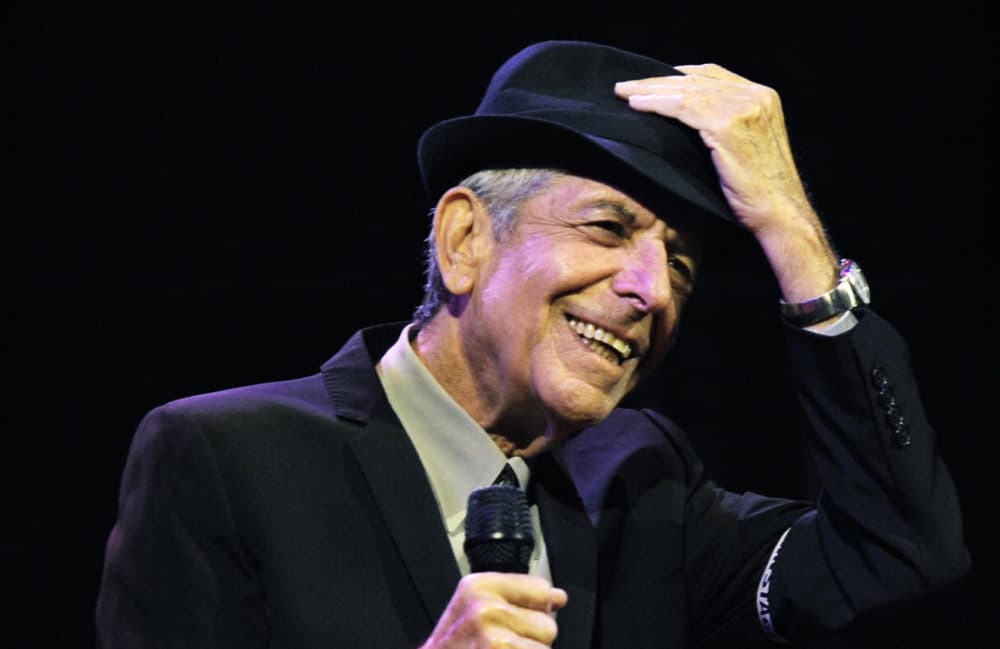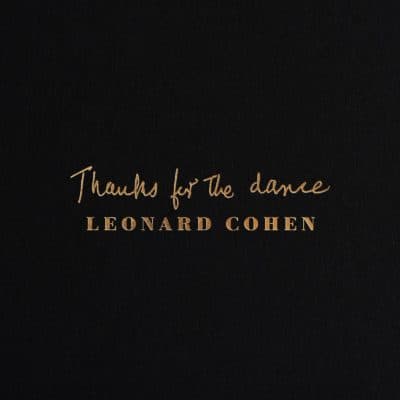Advertisement
Review
On 'Thanks For The Dance,' Leonard Cohen Gets A Little Help From His Friends

Sometimes, death is just a hiccup in a musician’s career. We know that a famous artist’s death does not necessarily mean the end of his or her creative output. There are, of course, live unreleased tracks and those previously recorded, but unfinished, songs that live in the vault. Maybe they were always supposed to be sealed, but with the artist not around to make the call, it’s not up to him or her, but up to the estate.
Jimi Hendrix’s estate, which has released at least 13 studio albums, was the first to school us on that, starting with “The Cry of Love” in March of 1971, not six months after his death. Johnny Cash died in 2003 and has three posthumous studio albums. Prince, who died in 2016, has none yet but his estate has teased us with zillions of tracks and millions of albums — The New Yorker’s Ian Frazier had some fun with that notion.

We thought Leonard Cohen’s swan song was the wrenching and appropriately titled, “You Want It Darker,” released in October of 2016, a month before his death at 82. As with David Bowie’s “Blackstar,” Cohen was clearly contemplating the end of his run, and his ruminative, penetrating lyrics and gruff, rumbling baritone brought us deep into those bowels. There was sadness, anger and grandeur and certainly, a sense of finality. (Not that death didn’t surface in Cohen’s previous works; consider 1977’s “Death of a Ladies Man.”)
But it wasn’t quite the finale. Here comes “Thanks for the Dance,” a short album (nine songs, clocking in under 30 minutes) to be released Nov. 22. It was cobbled together by his son Adam Cohen from what’s being called "bare musical sketches" — essentially Cohen’s spoken-word/barely sung poems — and set to spare musical accompaniment. (The music is mostly written or co-written by Adam.)
Cohen didn't lack admiring musician friends, players who no doubt jumped at the chance to work with him, albeit posthumously. Among the collaborators Adam Cohen enlisted: Beck, Daniel Lanois, Death Cab for Cutie's Zac Rae, the National's Bryce Dessner, Arcade Fire's Richard Reed Parry, Damien Rice, Jennifer Warnes and Leslie Feist. Javier Mas, Cohen's longtime bandmate, plays Spanish guitar — the album's dominant instrument.
A stark and gorgeous video of “Happens to the Heart,” directed by Daniel Askill and featuring actor Bobbi Salvör Menuez was released ahead of the album and already has 1.1 million plus YouTube views.
Not unlike Bowie’s “Lazarus,” the song’s power is greatly enhanced by the video. A worried Menuez, dressed like a young Cohen, walks slowly through the woods, stripping off layers of clothes before donning a monk’s black robe. They find peace while meditating (and elevating) at a cliff’s edge, overlooking a lake. Askill told Rolling Stone he wanted to make a video that spoke about Cohen’s years as a Zen monk — "a quiet, symbolic narrative that charts the letting go of ego and the trappings of fame."
It won’t surprise anyone to find that on “Thanks for the Dance” Cohen travels familiar territory. The tempos are mostly slow and stately, the moods somber, the singer still wrestling with the labyrinthine nature of love and lust, alongside themes of loneliness, lies and loss. In the title track, Cohen’s character ruefully thanks his wife “for the dance and the baby you carried/ It was almost a daughter or son” closing with “It was hell, it was swell, it was fun.”
In “Puppets,” Cohen casts most of the human race as puppets, but seems to load particular ridicule upon some unnamed man at the top: “Puppet presidents command/ Puppet troops to burn the land/ Puppet fire, puppet flames/ Feed on all the puppet names.”
Advertisement
Most people would consider Cohen’s music soft rock or chamber pop. But his lyrics were anything but cushy. I interviewed Cohen a couple of times. In 1993, when I brought up his raw, stripped-to-the-core lyrics on “The Future,” he said, "My only regret is that they're not bare enough. I hope if they give me a few more years, and a few more songs, it's going to get rawer and barer and more naked."
"I think, as you get older, that broad base, the range, gets very, very wide," he added. "You become more tolerant and more crotchety at the same time. More open and more critical. I think the confessional nature contracts at one end and opens at the other. You're willing to confess to yourself that you really do hate mankind, and, at another point, you're really willing to confess to yourself that you do feel a deep sense of fraternity with the whole human manifestation."
On “Thanks for the Dance,” there is a sense of gravitas — there was always a sense of gravitas, even when he was being playful — but this project, while gorgeous, sensual and heartbreaking in places, is also underwhelming. The delicate music supports the lyrics sufficiently, but they don’t often feel integrally wedded. Unlike “You Want It Darker” (and many of Cohen’s earlier works), his voice is not often set among dramatic arrangements or surrounded and buoyed by female backing vocals.
A welcome exception is the celestial-sounding “The Hills,” where Cohen’s resigned despair — "I can’t make the hills/ The system is shot/ I’m living on pills/ For which I thank God" — is countered by the uplifting voices of Erika Angell, Molly Sweeney and Lilah Larson.
“Thanks for the Dance” is an ideal record for the streaming age — fans will want to hear it, but won’t likely care about owning it or, if they’re in a Cohen mood, it wouldn’t be one of the first albums they’d return to.
But, I must say, Cohen never got complacent. He remained on a quest for something intangible and often unattainable. "I think the only way I can describe my spiritual odyssey,” he told me back in '93, “is to say that you realize that things don't last forever — the good ones or the bad ones. Sometimes you feel at home in your skin and sometimes you don't."

